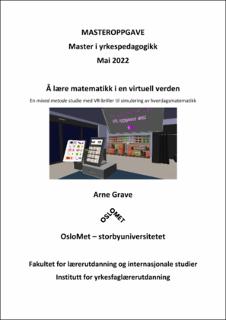| dc.description.abstract | To learn math in a virtual world, a mixed method study with VR glasses simulating everyday mathematics
Some students at Sales, Service and Tourism (SSR), a vocational field of study in upper secondary school, experience a lack of motivation and a mastery expectation in mathematics. This can occur due to many things such as previous experiences in the subject, or, in general, that this is a subject they never have mastered, and then they start a vocational education; VG1, where the expectations are that the way of teaching is based on practical methods. The mathematics subject hence often becomes a barrier for this group of students Not passing the subject can be what prevents them from completing their education.
Teachers, who teach mathematics in vocational subjects, and especially in SSR, are therefore constantly on the search for methods and tools helping this group of students to gain motivation and mastery expectation in mathematics. Knowledge of tools that can help with this in daily teaching is therefore desirable, and in this master's thesis I have investigated whether VR glasses can be such a tool. The goal is when using VR glasses, students will have positive experiences in mathematics by solving everyday challenges that require skills for mathematics in a virtual world, thus experiencing increased motivation, mastery expectations and learning outcomes.
We use VR glasses to simulate situations the students recognize themselves in, where they must use basic mathematics to solve problems in a game-like virtual world. In the thesis, I have based a socio-cultural view of learning, where the VR glasses are mediating artifacts, where the development of knowledge takes place form of reflection with other students, in an associated context.
In this master's thesis, I have carried out a method triangulation through a quantitative approach with a quasi-experiment and a qualitative section through a focus group interview. A selection of 35 students in VG1 SSR at an upper secondary school was part of the quasi-experiment. They were divided into 14 students in the experiment group, who were allowed to use VR glasses during the experiment period, and 21 students in the control group, exposed for traditional teaching in the same period. All students in the selection answered both the questionnaire and had a knowledge test both pre and post before the intervention. In addition, five students from the experimental group participated in a focus group interview immediately after the intervention.
The quantitative data from the surveys do not provide significant findings demonstrating the effect of the quasi-experiment, but the qualitative findings still indicate that the VR glasses are exciting as a pedagogical tool for creating enthusiasm and interest in the learning process.
The use of VR glasses had many positive aspects emerging in the focus group interview, and based on this, several useful aspects emerged, which I recommend for further research in this area. Especially the part with reflection and sharing of experiences, as well as the benefit of being able to try making mistakes on your own, without anyone else seeing what kind of mistakes you made, is useful information from the focus group interview. The students pointed out that this was a good starting point for learning, in addition to VR glasses as fun and thus a motivating form of teaching. | en_US |
